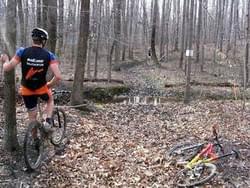




By Scott Linnenburger, Director of Field Programs, International Mountain Bicycling Association
The State of Maryland and bicyclists work together to improve trails and for trail training.

The International Mountain Bicycling Association's (IMBA) Trail Specialist, Rich Edwards, offers, "the biggest risks to trail access across the country is the impossibility of adequately maintaining bad trails, the deferred maintenance of mediocre trails, and the resulting situation of park visitors feeling like they need to create their own experience (illicit trails) to make their visit a positive one. In each case, these trails are harming natural resources and could eventually be seen as incompatible with good resource management. Of course, with less public access naturally comes less public support for parks and even further budget cuts. It's a no-win situation. We've got to work together to encourage a higher level of functionality and cooperation regarding trails."
Recently the Maryland Park Service was faced with a quandary- how to improve the condition of its State Park and Forest trail systems without a staff sufficiently trained in trail planning, design, construction, and maintenance. The trails were receiving more visitation and more volunteer support, but were also eroding more and causing more resource damage.
The answer revealed itself- MORE, the Mid-Atlantic Off-Road Enthusiasts, a regional mountain biking club that stewards a number of Maryland trail systems offered to broker the training of Maryland's land management officials. MORE's track record of taking trails from a resource-damaging state to one of ecological and social sustainability, not to mention a better experience for mountain bikers, hikers, runners, and equestrians was unmatched in the State and opened the door to a $75,000 grant from the State of Maryland.
MORE turned to IMBA Trail Solutions, a fee-based trail consulting, contracting, and education program, to customize a training curriculum for Maryland Park Service staff. The first goal was to level the knowledge playing field and Trail Solutions led four, two-day classroom and field-based basic trailbuilding schools.
"It's important for agency officials to understand that trails are a conservation tool as well as a recreational facility," states IMBA Trail Specialist Rich Edwards, "and considering the duality in purpose for trail facilitieslays the foundation for better resource management AND better trail experiences. When we get there, we've take a no-win situation and created a win-win situation." For staff that only dealt secondarily in trails, completion of this course allowed them to recognize common trail problems, institute corrective measures, and attain a common language with other staff and volunteers regarding these issues.
Staff that required a higher level of understanding- those individuals planning, approving, building, or fixing poorly conceived trail systems- Trail Solutions put together advanced courses on Planning and Design, Mechanized Trailbuilding, and Wet Area Solutions. These field-intensive, three-day courses brought Maryland Park Service trail leaders in closer contact with one another along with the high level training that prepared them to deal with many of the issues faced on Maryland's public lands. Nita Settina, Maryland Park Service liaison for this project noted, "the amount of knowledge that IMBA brought to the table was absolutely amazing, but just as important was building our internal relationships through these courses. Now, when we encounter a tough problem, there's a better idea within the Park Service of who has dealt with something similar before or who has special talents in some area. We don't have to reinvent the wheel and that ultimately produces a better trail product."
In total, over 150 individuals attended the courses and almost a dozen completed the entire four-course curriculum. The courses were held in eight different State Parks and Forests in each of Maryland's physiographic provinces, allowing staff to learn in the environments that they most often work, whether it was the coastal plain, piedmont, or western Maryland mountains.
The trainings are already paying dividends on the ground as the Maryland Conservation Corps and Patapsco Trail Crew have planned extensive trail reroutes into their ambitious 2007 schedule of work and Park officials are more familiar with the capabilities of, and can better direct, volunteer groups such as MORE. "Knowledge is power and we (MORE) believe that this investment by the Maryland Park Service, coupled with a higher level of coordination between the agency and volunteer groups, is going to pay dividends for decades," emphatically stated Dan Hudson, one of MORE's lead trailbuilders. "As consumers of the parks' Ôproduct' of trails we all need to work together to make sure the cost of maintenance and upkeep doesn't keep rising and that means more environmentally sustainable trails that better handle increased use."
"The status quo risks access to these great parks for our children and grandchildren," adds another MORE leader Austin Steo, "and therefore it's necessary to make the investment of volunteer stewardship now. The State's dedication of resources toward this same end demonstrates that we all envision the same, better future for trails in our State." With these and other progressive plans being developed and supported by the Maryland Park Service, the State of Maryland again approved a large grant to MORE for 2007 to keep up the good work in improving the State's parks, forests, and trails.